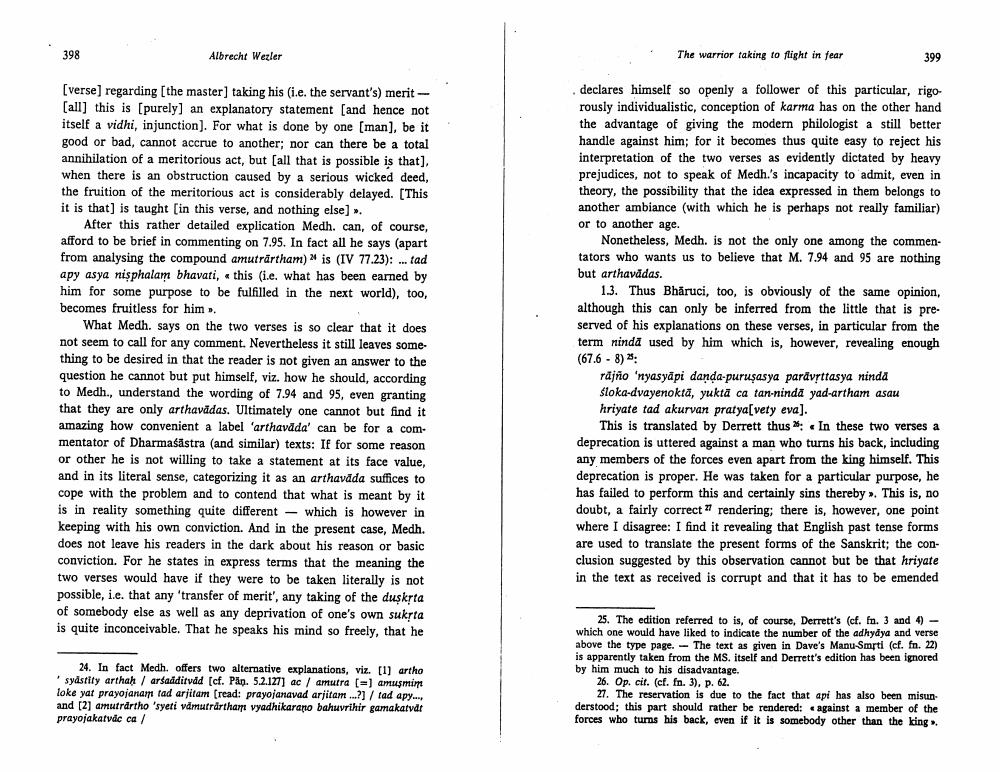________________
398
Albrecht Wezler
The warrior taking to flight in fear
399
(verse) regarding (the master) taking his (i.e. the servant's) merit(all] this is (purely) an explanatory statement (and hence not itself a vidhi, injunction). For what is done by one (man), be it good or bad, cannot accrue to another; nor can there be a total annihilation of a meritorious act, but (all that is possible is that). when there is an obstruction caused by a serious wicked deed, the fruition of the meritorious act is considerably delayed. (This it is that] is taught (in this verse, and nothing else).
After this rather detailed explication Medh. can, of course, afford to be brief in commenting on 7.95. In fact all he says (apart from analysing the compound amutrartham) is (IV 77.23): ... tad apy asya nisphalam bhavati, this i.e. what has been earned by him for some purpose to be fulfilled in the next world), too, becomes fruitless for him .
What Medh. says on the two verses is so clear that it does not seem to call for any comment. Nevertheless it still leaves some thing to be desired in that the reader is not given an answer to the question he cannot but put himself, viz. how he should, according to Medh., understand the wording of 7.94 and 95, even granting that they are only arthavddas. Ultimately one cannot but find it amazing how convenient a label 'arthavdda' can be for a commentator of Dharmasastra (and similar) texts: If for some reason or other he is not willing to take a statement at its face value, and in its literal sense, categorizing it as an arthavada suffices to cope with the problem and to contend that what is meant by it is in reality something quite different - which is however in keeping with his own conviction. And in the present case, Medh. does not leave his readers in the dark about his reason or basic conviction. For he states in express terms that the meaning the two verses would have if they were to be taken literally is not possible, i.e. that any 'transfer of merit', any taking of the duskyta of somebody else as well as any deprivation of one's own suksta is quite inconceivable. That he speaks his mind so freely, that he
declares himself so openly a follower of this particular, rigorously individualistic, conception of karma has on the other hand the advantage of giving the modern philologist a still better handle against him; for it becomes thus quite easy to reject his interpretation of the two verses as evidently dictated by heavy prejudices, not to speak of Medh.'s incapacity to admit, even in theory, the possibility that the idea expressed in them belongs to another ambiance (with which he is perhaps not really familiar) or to another age.
Nonetheless, Medh. is not the only one among the commentators who wants us to believe that M. 7.94 and 95 are nothing but arthavadas.
1.3. Thus Bharuci, too, is obviously of the same opinion, although this can only be inferred from the little that is preserved of his explanations on these verses, in particular from the term ninda used by him which is, however, revealing enough (67.6 - 8) :
rájño 'nyasyapi danda-puruşasya pardvęttasya ninda Sloka-dvayenokta, yukta ca tan-ninda yad-artham asau hriyate tad akurvan pratya[vety eva).
This is translated by Derrett thus : In these two verses a deprecation is uttered against a man who turns his back, including any members of the forces even apart from the king himself. This deprecation is proper. He was taken for a particular purpose, he has failed to perform this and certainly sins thereby». This is, no doubt, a fairly correct rendering; there is, however, one point where I disagree: I find it revealing that English past tense forms are used to translate the present forms of the Sanskrit; the conclusion suggested by this observation cannot but be that hriyate in the text as received is corrupt and that it has to be emended
24. In fact Medh. offers two alternative explanations, viz. (1) artho sydstily arthah / arsaddirydd (cf. Pån. 5.2.127] ac/amutra () musmir loke yat prayojanar tad arjitam (read: prayojanavad arjitam...?1 / tad apy ..., and [2] amutrartho'syeti vdmurdthat vyadhikararo bahuvihir gamakatvdt prayojakalvdc ca/
25. The edition referred to is, of course, Derrett's (cf. fn. 3 and 4 - which one would have liked to indicate the number of the adhydya and verse above the type page. - The text as given in Dave's Manu-Smrti (cf. fn. 22) is apparently taken from the MS. itself and Derrett's edition has been ignored by him much to his disadvantage.
26. Op. cit. (cf. fn. 3), p. 62.
27. The reservation is due to the fact that api has also been misunderstood; this part should rather be rendered: against a member of the forces who turns his back, even if it is somebody other than the king




